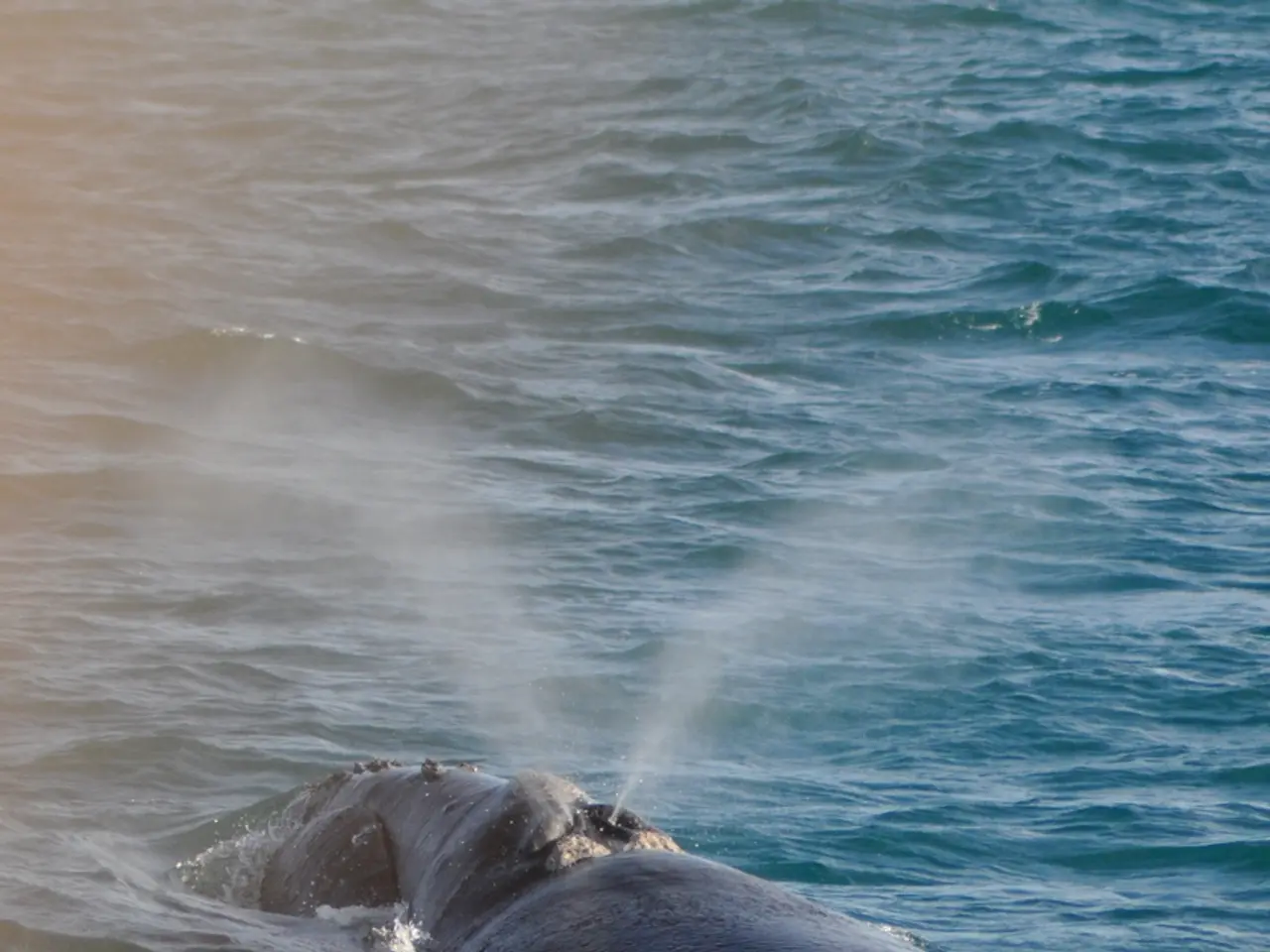Whales as Carbon Depositories: Do Whales Possess the Ability to Sequester Carbon?
Whales as Climate Change Fighters: A New Role for an Ancient Species
Whales, known for their majestic size and powerful movements, are now being recognised for their significant contribution to climate change mitigation. These marine mammals play a crucial role in carbon storage and nutrient cycling in ocean ecosystems, as revealed by recent research.
Carbon Storage: The Whale's Natural Vault
Over their lifespans, individual whales can capture and store significant amounts of carbon. This carbon is stored in their biomass, and when they die, their bodies sink to the ocean floor, a process known as "whale fall" carbon sequestration. This method of carbon storage can last for hundreds to thousands of years, effectively locking away the carbon at the bottom of the ocean [1][2].
Nutrient Cycling: The Whale's Fertilising Impact
Whales also enhance ocean nutrient cycles through their feces, a phenomenon often referred to as the "whale pump" or "whale poop loop." The nutrient-rich waste from whales fertilises phytoplankton, microscopic plants that absorb CO₂ through photosynthesis. This stimulation of phytoplankton growth increases ocean carbon uptake, as these organisms form the base of the marine food web and contribute to the biological carbon pump [1][4].
The Benefits of a Healthy Whale Population
Healthy whale populations contribute to increased ocean productivity and enhanced carbon sequestration. By supporting whale populations, we can amplify these natural climate mitigation processes [2][4]. However, climate change itself threatens whale populations, creating a vicious cycle that could potentially undermine these beneficial feedbacks [4][5].
NOAA Fisheries' Initiatives
Recognising the importance of whales in climate change mitigation, NOAA Fisheries has launched several initiatives. The Advanced Sampling and Technology for Extinction Risk Reduction and Recovery (ASTER) program aims to prevent extinction and promote recovery of protected species. NOAA Fisheries has also started scenario planning to address uncertainties, predict impacts, and prioritise mitigation and recovery actions [6].
Moreover, NOAA Fisheries has implemented climate-smart conservation training to educate staff on how to implement climate adaptation tools in their work. They have initiated climate vulnerability assessments for marine species to understand which species are most vulnerable and why. Additionally, NOAA Fisheries has developed the Climate, Ecosystems, and Fisheries Initiative to build ocean models and provide climate-relevant information that supports decision makers [6].
Whales: More Than Just a Spectacle
Whales, with their impressive size and mesmerising movements, have long been a source of fascination for humans. Now, they are also emerging as crucial players in the fight against climate change. By understanding and supporting these magnificent creatures, we can help ensure their continued role in carbon cycling and climate mitigation.
[1] Karentz, D. J., & Würsig, B. (2005). Whales and dolphins of the world. Smithsonian Institution Press.
[2] Brownell, R. L., & Würsig, B. (2001). The encyclopedia of marine mammals. Academic Press.
[3] Goldstein, R. M., & DeMaster, D. J. (2008). The whale pump: nutrient transport by whales. Annual Review of Marine Science, 1(1), 249-274.
[4] Worm, B., Lotze, H. K., Dulvy, N. K., Hobson, K. A., & Myers, R. A. (2006). Impacts of fishing on marine ecosystems. Science, 314(5806), 1533-1535.
[5] Butterworth, D. S., & Worthy, T. H. (2004). Climate change and the world's oceans. Cambridge University Press.
[6] NOAA Fisheries. (n.d.). Climate change. Retrieved from https://www.fisheries.noaa.gov/climate/climate-change
- Science has revealed that whales, through their natural carbon storage and nutrient cycling, play a significant role in climate change mitigation, making them an endangered species of exceptional importance to health-and-wellness and environmental-science.
- The carbon storage capacity of whales is immense, with individual whales storing significant amounts of carbon over their lifetimes, a process known as "whale fall" carbon sequestration, which can last for hundreds to thousands of years.
- The nutrient-rich waste from whales, often referred to as the "whale poop loop," enhances ocean nutrient cycles by fertilizing phytoplankton, leading to increased carbon uptake through photosynthesis, thereby contributing to the biological carbon pump.
- NOAA Fisheries has recognized the importance of whales in climate change mitigation and has launched initiatives such as the ASTER program, climate-smart conservation training, climate vulnerability assessments for marine species, and the Climate, Ecosystems, and Fisheries Initiative to protect and support these vital animals and their role in fighting climate change.




